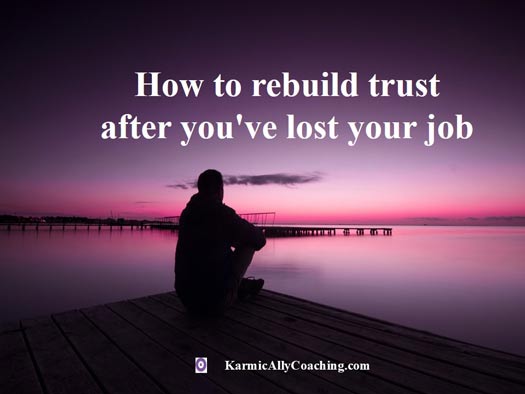
When recessions happen, nobody’s job is safe or secure and the sword of the pink slip hangs over all our heads.
But nothing can beat the job losses and layoffs that have taken place after COVID-19. Not even the global economic meltdown of 2008.
In the early days of the complete lockdown, Quora was filled with questions from professionals who had been made redundant asking for legal advice and help. Many businesses either downed their shutters or sent their employees on unpaid leave for long periods. There was no guarantee of a job if the business reopened.
I was horrified to learn that many people didn’t even get their statutory dues. Even despite the government having made it clear that no action should be taken to create a problem for workers.
It reminded me of the times I had been laid off during my 3-decade corporate career and how the management in those companies had handled the situation with compassion and care. They made sure I got my dues and the goodwill that has stayed over the years.
I still trust those companies and am a proud member of their Alumni Groups on LinkedIn.
But it’s not always like that
Compared to a few decades ago, redundancy has become a normal word in our vocabulary. Yet it doesn’t reflect the impact on the affected worker.
For many professionals, their very identity is tied to their job and when that is gone, they feel lost.
It doesn’t matter if the employer had to let them go because of economic conditions or a company decision to reduce head count in a merger or restructuring. The individual does get affected in more ways than one would think.
There is the immediate and even longer-term financial aftermath the employee will experience. Research repeatedly shows the lasting impact layoffs can have on individuals’ emotional and mental health.
It is not uncommon for the laid off person to experience emotional and even physical reactions to losing their job.
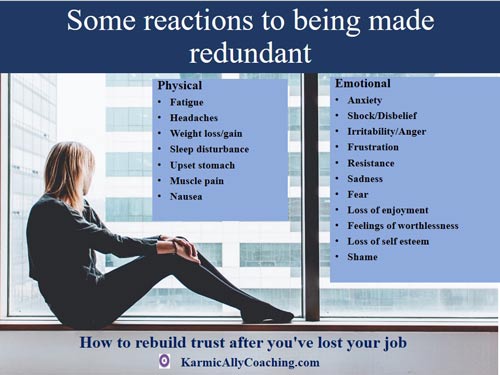
One area we need to address is how job loss affects our Trust
Back in 2015, I had read about a study done by Manchester University that revealed that workers who’d been laid off are less willing to trust others. Those doubts can linger for ten years or more even after starting a new job.
The study was part of a bigger collaboration between Manchester and Harvard University where they focused not only on the individual but the community as a whole.
While the study didn’t empirically look at why people’s trust in others went down, it could have been that sense of betrayal and change in perception about the world.
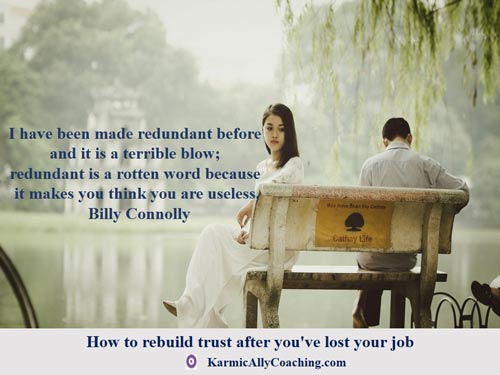
People are taught to work hard for their employer and receive rewards for their efforts but when they’re made redundant, it is confusing. After all, they’ve played by the rules, right?
To be honest, that’s exactly how I felt when I experienced my first redundancy shortly after the Gulf War ended. While the rest of the office along with the then Country Manager went back to their countries, I stayed and worked on all my assignments with my supervisor in Doha.
When the war ended and things were back to normal, I think the stress finally took its toll and I fell sick. The doctor prescribed complete bed rest and I was given sick leave.
Then I got a call from the office that the Partner who had come for a visit from Bahrain wanted to meet me. Of course I went in, completely sick and weak.
He was nice to me but dropped the bombshell that the offices in the region were downsizing and they had to reduce the Doha office to half. The principle to be applied was Last In, First Out.
He was very nice about it and was appreciative of my efforts. I was given the option of taking 3 months’ salary and exiting or working on a 3 month notice. I was promised a good reference.
My supervisor suggested I work out the notice period while I tried to find a new job in a recessionary economy which I did.
When I look back now, it was a generous offer as I was statutorily not entitled to it, the Partner wanted to tell me himself instead of my supervisor who was now the Country Manager but yes, I felt let down.
After all, when the menfolk ran away to their countries, a female employee stayed behind and worked. And she was being given the boot on a silly last in first out method!
It was my first real job after qualifying as a Chartered Accountant. This wasn’t how I expected my career to start.
But I did go places after that and when I discovered the Partner on LinkedIn almost 25 years later, I sent an invitation to connect and he accepted it.
Roslyn Tanner Evan’s who is a former career counselor now turned jewelry designer addresses this point in her powerful post 5 honest job loss truths that need to be shared. It is a must read if you are facing this situation right now.
If you lost your job or just value a workplace with a culture of trust, there are ways to build that sense of community.
I’ve heard of people literally being told they were being let go of with about 10 minutes to pack up their desk and then being escorted out of the building.
This usually happens in high security and confidential companies and if that happened to me, I know I’d have a trust issue going forward. That in itself is a traumatic memory that can create a distrust of all employers and affect our work.
Consider these suggestions for steps you can take yourself and qualities you can look for in your next employer.
Steps to take for building Trust in the Workplace
Give trust to receive trust. Trust is a two-way street. While it will be challenging at first, make the first move to overcome your fear of betrayal.
These are new people and a new beginning. You’re more likely to gain the confidence of your new colleagues by demonstrating you trust them. Keep the healthy boundaries but go into work with a positive frame of mind.
Become known as a professional who walks their talk. Align your actions with your speech. When you commit to completing a project or report within a timeline, do it and let your supervisor know about your progress or roadblocks. Become a role model for others.
Express gratitude. It’s the little things that make the biggest difference. As my emotionally intelligent first mentor told me, small gestures matter.
In all my jobs, I always made it a point to say good morning to every staffer I saw on the way to my office. It was simply good manners but I got the best return possible – in one of those jobs, the pantry man was so touched that I saw him as a fellow worker that he’d make sure I had a mug of coffee at my desk within 5 minutes of my arrival even if the other Managers had to wait till coffee time.
He’d found out I had a long commute to work and this was his small gesture in return for a simple morning greeting.
Another colleague used to bring back chocolates for the team when he’d come back from vacation as a gesture to thank us for taking on his work while he was away. We were always happy to have him back.
Don’t hog all the praise. Learn to share credit. Most victories are team efforts. Show your colleagues that you understand and appreciate the role that they play in putting together a board meeting or cleaning up the break room. If you’re the manager, take the team out for lunch or arrange a special outing to let them know they are all part of the success story.
Value relationships. The quality of your relationships determines the level of trust you’ll enjoy around the office. Treat others with respect and compassion. Be willing to compromise on individual issues so you can maintain positive office relationships.
Above all, demonstrate emotional intelligence when dealing with others.
Think of it as an opportunity to regain ground in your career and move forward with a positive mindset.
Qualities to look for in an Employer in your Post Redundancy Job
One of the biggest trust issues after a redundancy comes down to our having faith in future employers.
Not every employer is the same and sometimes a redundancy can lead you to a new job where you’ll love the new employer and want to come in to work.
So how will you figure out if the employer is the right one for you?
Here are a few things to research about the prospective employer.
What’s the turnover at the company? This is an important indicator for finding a good employer. Trust and engagement are closely related, and engaged workers tend to stay on the job longer.
Different industries have different turnovers depending upon demand and supply of skilled labor but it’s a good idea to ask about the turnover rate when considering a job offer to avoid joining a long line of predecessors with short tenures.
Proceed from the ground up. Trust is part of the job description at each level in an organization. Feeling comfortable with your supervisor and the co-workers you’ll see daily may be more important than any statements from the CEO.
Are they open to new ideas and encourage innovation? Are suggestions greeted with enthusiasm? Are employees commended for trying to increase quality and save money regardless of whether their proposals need some refining?
When I worked in the Insurance Sector, our Managing Director used to have Monday breakfast meetings with the entire office.
We’d go over targets and sales and everyone, even from outside the specific department would be encouraged to share ideas that might help us meet our goals.
The end result? We’d overshoot our goals sometimes and adjust it against the lean months.
Practice fairness. Another indication of high levels of trust is a commitment to justice and fair play. Does the company have a robust code of conduct and ethics? Do the same rules and discipline procedures apply to entry-level employees and top management? Are employees empowered to use their own discretion and judgement to complete assignments?
Reward competence. Naturally, trust thrives when you and your employer believe in your ability to do the job.
Employers who provide training and constructive feedback may help you to put your redundancy behind you and move on with greater confidence.
One of the best indicators I have experienced in finding a job after a redundancy is the compensation package that is offered.
There are employers who would take into account your weak positioning. Especially if you’ve been unemployed for a long period of time.
Others will demonstrate their confidence in your ability by offering you a package commensurate with your experience and skills.
It shows they value what you’re bringing to the table and not out to grab a bargain deal. It’s also how you retain good talent and build the human capital of an enterprise.
Losing your job is a serious event, so take the time and effort you need to heal. The good news is that you can learn to trust again.
Wherever you find your next position, your actions can help you to put your career back on track and become a valued member of your new team.
Additional Resource
I provide a complete roadmap and guidance for finding the right employment in my Job Search Success Bundle. Click the preceding link or on the image below to learn more.


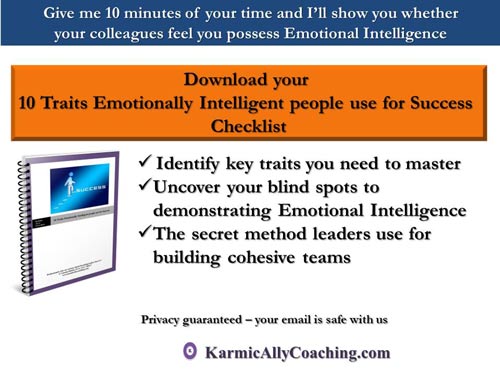
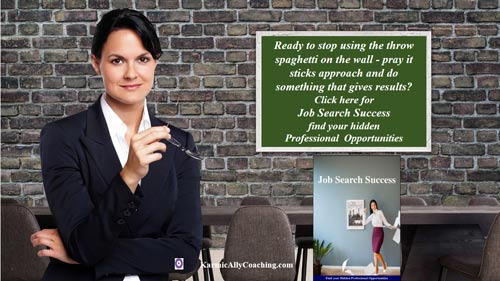

 I adhere to the Certified Coaches Alliance Code of Ethics and Standards. A copy is available on request.
I adhere to the Certified Coaches Alliance Code of Ethics and Standards. A copy is available on request.
 Let's Talk through the Connect Form:
Let's Talk through the Connect Form: